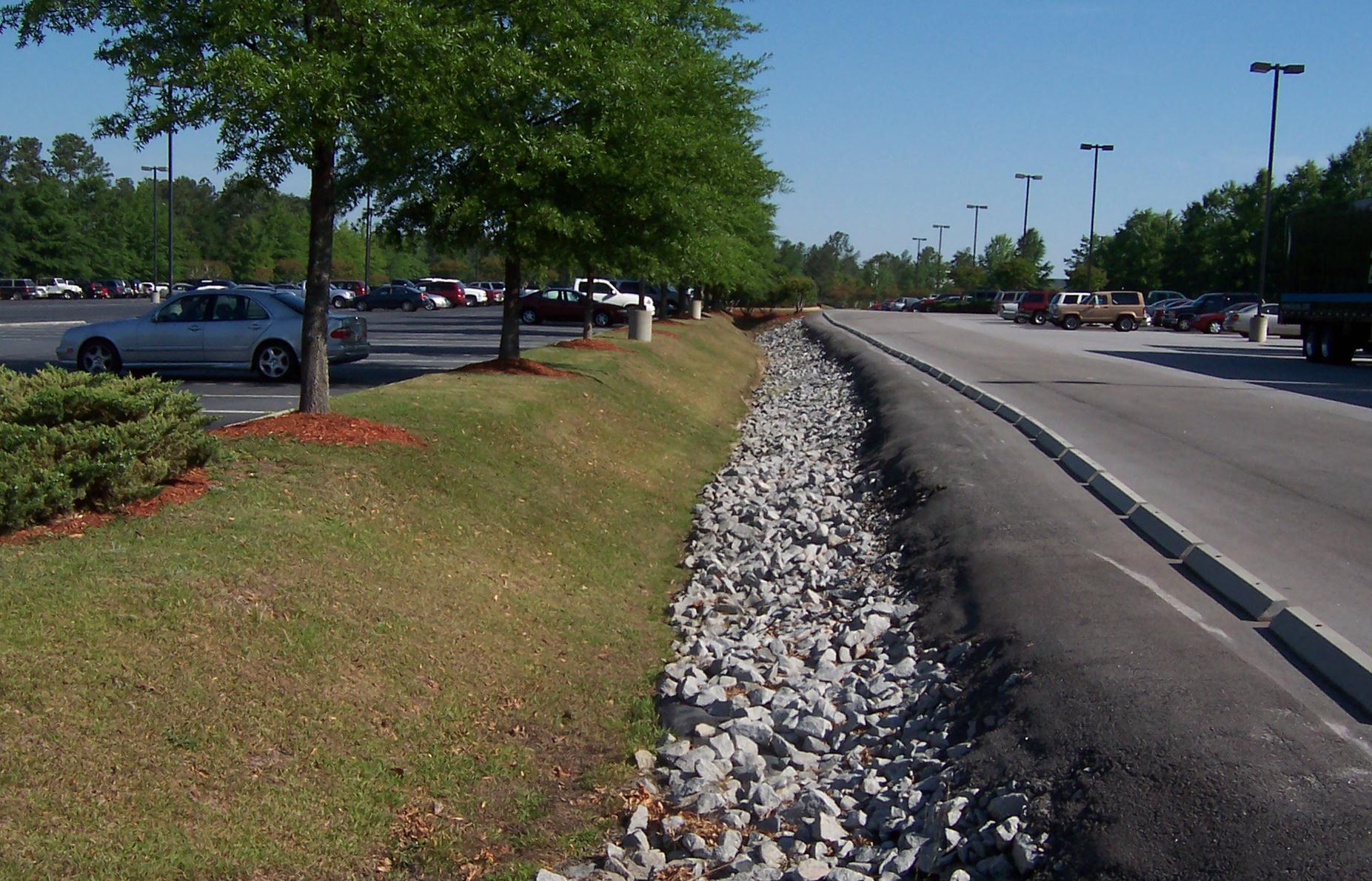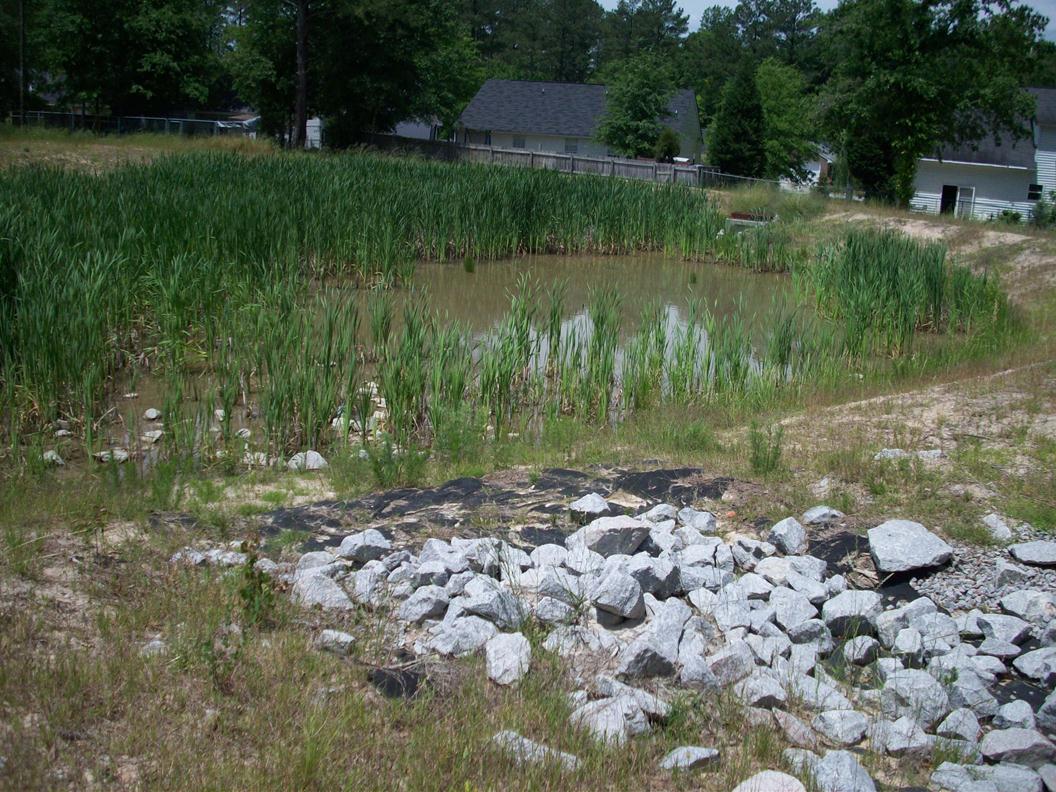Inspections Section
Stormwater Management inspectors conduct inspections of county owned and privately maintained detention ponds, Stormwater management structures, industrial facilities, County facilities, and respond to complaints of suspected illicit discharges into the County's drainage system. The section works closely with the Roads and Drainage division to investigate complaints of flooding or maintenance needs of the drainage network.
Richland County Stormwater has a variety of programs that involve inspection of facilities and stormwater BMPs. Many of these programs focus on illicit discharges—the discharge of any type of pollutant into a storm drain—or maintaining stormwater best management practices (BMPs) that control the flow of stormwater runoff.
County-Maintained BMPs, Ponds, and Ditches

Richland County owns over 40 ponds and 20 miles of ditches for the purpose of stormwater control. These structural BMPs are designed to minimize the volume and velocity of runoff to prevent damage to the land and homes. Detention ponds are maintained by cutting back vegetation and ensuring they are functioning properly, while ditches are maintained by cutting back spraying herbicide to reduce vegetation growth. BMPs also allow pollutants to settle into the grounds instead of directly washing into a nearby waterway.
Illicit Discharge and Illegal Dumping (IDID) and Illicit Discharge Detection and Elimination (IDDE)
Illicit discharges are any form of pollution that is draining into a storm drain/inlet. Illegal dumping is the disposal of waste in an area that has the potential for stormwater runoff to enter a storm water drainage. These areas may include a portion of a yard, the edge of a stream bank, or an off-road area. The objective of the IDID/IDDE program is to detect any incidences of an illicit discharge, identify the source or cause, and take measures to eliminating the discharge (and source). Illicit discharges and illegal dumping is a violation of Richland County Code of Ordinances and will be investigated by a Code Enforcement Officer. Be a part of our team and report illicit discharges to our Stormwater Hotline at 803-929-6000.
Industrial and High Risk Runoff (IHR)
Discharges from industrial sites may contain pollutants that could affect the quality of streams and rivers nearby. The purpose Richland County’s Industrial and High Risk Runoff Control program is to reduce pollutant loading and improve the quality of storm water runoff discharging from industrial and high risk facilities within the county. During a the permit cycle we inspect a variety of facilities, including electronics manufacturers, wood treatment plants, and industrial solvent manufacturers.

Pesticide, Herbicide, and Fertilizer (PHF) Control
According to the Environmental Protection Agency, 25% of the pollutants found in rivers and streams originate from residential use of pesticides, herbicides, and fertilizers. These materials can enter into the storm water system through illegal dumping, run-off from excess lawn irrigation, and heavy rains. As a result, the PHF program is designed to reduce the discharge of pollutants related to the storage and application of PHFs applied by County employees or contractors to public rights-of-way, parks, and other public property.
Private Pond Inspection Program (PPIP)
There are over 60 privately owned ponds in the vicinities covered by the Richland County MS4 permit and those ponds are required to comply with County Code of Ordinance that protects the quality of stormwater. The Private Pond Inspection Program inspects each of these ponds annually to determine if they are in compliance. Property owners of ponds that do not meet the Code receive a Notice of Violation with instructions on actions the owner should take to become compliant.
Roadway Runoff Management Program (RRMP)
The Richland County Roadway Runoff Management Program aids in reducing the amount of runoff from paved and unpaved roads, and improving the quality of the stormwater runoff from County owned highways. The program includes BMPs utilized by the County to manage the quantity and control the quality of stormwater runoff from County owned highways as well as standard practices utilized to reduce pollutants in stormwater.
Sanitary Sewer Overflow (SSO)
Sanitary sewer overflows occur when untreated sewage from pipes discharges into the environment and potential becomes stormwater pollution. RCSH2O responds to reports from citizens or SCDHEC by inspecting the claim and contacting the utility or property owner so they can address the issue. If you detect any substance flowing into a storm drain other than stormwater, it is considered an illicit discharge and should be reported by calling 803-929-6000.
Spill Prevention Control and Countermeasures (SPCC) and Stormwater Pollution Prevention Plan (SWPPP)
County-maintained facilities undergo pollution prevention inspections through the spill prevention control and countermeasure program and the stormwater pollution prevention plan. These plans set forth requirements for good housekeeping, prevention, and response to spills for County-maintained facilities as well as identifying structural and non-structural best management practices that can be put in place to reduce erosion and run-off of pollutants and sediment.
There are eleven different categories of stormwater discharge that are associated with industrial activity and require SWPPPs.
Click here to view the list of categories. Richland County inspects implementation of post-construction SWPPPs in unincorporated County areas.